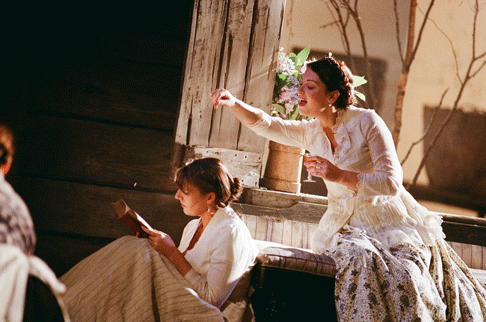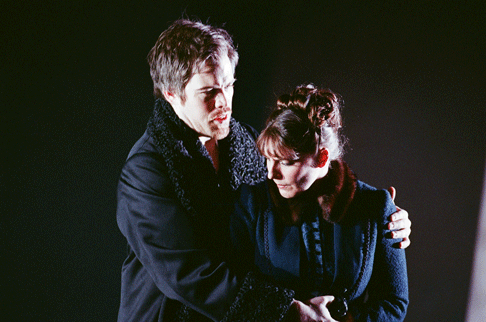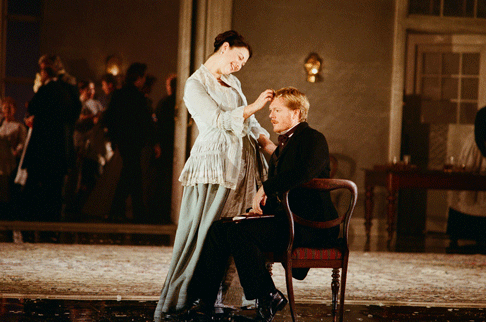![Amanda Echalaz as Tatiana [Photo by Neil Libbert courtesy of English National Opera]](http://www.operatoday.com/Onegin_ENO_2011_02.gif)
15 Nov 2011
Eugene Onegin, ENO
Deborah Warner’s new production of Tchaikovsky’s Eugene Onegin is an evocative and lyrical depiction of elegiac passion.
English Touring Opera are delighted to announce a season of lyric monodramas to tour nationally from October to December. The season features music for solo singer and piano by Argento, Britten, Tippett and Shostakovich with a bold and inventive approach to making opera during social distancing.
This tenth of ten Live from London concerts was in fact a recorded live performance from California. It was no less enjoyable for that, and it was also uplifting to learn that this wasn’t in fact the ‘last’ LfL event that we will be able to enjoy, courtesy of VOCES8 and their fellow vocal ensembles (more below …).
Ever since Wigmore Hall announced their superb series of autumn concerts, all streamed live and available free of charge, I’d been looking forward to this song recital by Ian Bostridge and Imogen Cooper.
Although Stile Antico’s programme article for their Live from London recital introduced their selection from the many treasures of the English Renaissance in the context of the theological debates and upheavals of the Tudor and Elizabethan years, their performance was more evocative of private chamber music than of public liturgy.
Evidently, face masks don’t stifle appreciative “Bravo!”s. And, reducing audience numbers doesn’t lower the volume of such acclamations. For, the audience at Wigmore Hall gave soprano Elizabeth Llewellyn and pianist Simon Lepper a greatly deserved warm reception and hearty response following this lunchtime recital of late-Romantic song.
For this week’s Live from London vocal recital we moved from the home of VOCES8, St Anne and St Agnes in the City of London, to Kings Place, where The Sixteen - who have been associate artists at the venue for some time - presented a programme of music and words bound together by the theme of ‘reflection’.
'Such is your divine Disposation that both you excellently understand, and royally entertaine the Exercise of Musicke.’
‘And there was war in heaven: Michael and his angels fought against the dragon; and the dragon fought and his angels, And prevailed not; neither was their place found any more in heaven … that old serpent … Satan, which deceiveth the whole world: he was cast out into the earth, and his angels were cast out with him.’
There was never any doubt that the fifth of the twelve Met Stars Live in Concert broadcasts was going to be a palpably intense and vivid event, as well as a musically stunning and theatrically enervating experience.
‘Love’ was the theme for this Live from London performance by Apollo5. Given the complexity and diversity of that human emotion, and Apollo5’s reputation for versatility and diverse repertoire, ranging from Renaissance choral music to jazz, from contemporary classical works to popular song, it was no surprise that their programme spanned 500 years and several musical styles.
The Academy of St Martin in the Fields have titled their autumn series of eight concerts - which are taking place at 5pm and 7.30pm on two Saturdays each month at their home venue in Trafalgar Square, and being filmed for streaming the following Thursday - ‘re:connect’.
The London Symphony Orchestra opened their Autumn 2020 season with a homage to Oliver Knussen, who died at the age of 66 in July 2018. The programme traced a national musical lineage through the twentieth century, from Britten to Knussen, on to Mark-Anthony Turnage, and entwining the LSO and Rattle too.
With the Live from London digital vocal festival entering the second half of the series, the festival’s host, VOCES8, returned to their home at St Annes and St Agnes in the City of London to present a sequence of ‘Choral Dances’ - vocal music inspired by dance, embracing diverse genres from the Renaissance madrigal to swing jazz.
Just a few unison string wriggles from the opening of Mozart’s overture to Le nozze di Figaro are enough to make any opera-lover perch on the edge of their seat, in excited anticipation of the drama in music to come, so there could be no other curtain-raiser for this Gala Concert at the Royal Opera House, the latest instalment from ‘their House’ to ‘our houses’.
"Before the ending of the day, creator of all things, we pray that, with your accustomed mercy, you may watch over us."
The doors at The Metropolitan Opera will not open to live audiences until 2021 at the earliest, and the likelihood of normal operatic life resuming in cities around the world looks but a distant dream at present. But, while we may not be invited from our homes into the opera house for some time yet, with its free daily screenings of past productions and its pay-per-view Met Stars Live in Concert series, the Met continues to bring opera into our homes.
Music-making at this year’s Grange Festival Opera may have fallen silent in June and July, but the country house and extensive grounds of The Grange provided an ideal setting for a weekend of twelve specially conceived ‘promenade’ performances encompassing music and dance.
There’s a “slide of harmony” and “all the bones leave your body at that moment and you collapse to the floor, it’s so extraordinary.”
“Music for a while, shall all your cares beguile.”
The hum of bees rising from myriad scented blooms; gentle strains of birdsong; the cheerful chatter of picnickers beside a still lake; decorous thwacks of leather on willow; song and music floating through the warm evening air.
![Amanda Echalaz as Tatiana [Photo by Neil Libbert courtesy of English National Opera]](http://www.operatoday.com/Onegin_ENO_2011_02.gif)
Deborah Warner’s new production of Tchaikovsky’s Eugene Onegin is an evocative and lyrical depiction of elegiac passion.
Fittingly for a work drawn from Pushkin’s verse novel, Warner’s vision is literary in its inspiration. Moving the action forward fifty years, from Pushkin’s 1840s to the late-nineteenth century, the director and her designer, Tom Pye, conjure a moving picture of Chekovian ‘twilight moods’. The pace is gently controlled; beautifully rendered natural scene drops unfold, like pages of a book, as we move through the chapters of the protagonists’ lives. The visual detail and accuracy of observation recalls Chekhov’s stylised blend of realism and romance.
Pye’s designs are sumptuous and surprising. The imposing ballroom columns of the third act, through which polonaising couples burst, justly won an instantaneous gasp of applause; cleverly, as the suppressed emotions of the social interior are exchanged for the freedom of the natural exterior, the splendid pillars become terrace colonnades – their majesty emphasising the tragic frailty of the protagonists. Most impressive was the silvery lakeside expanse of the second act, all glistening ice, wintry branches and shimmering mist – perfectly capturing the frozen emotions of the duellists who are alienated by jealousy, pride and convention.
The only puzzle was the vast barn of act one, which replaced the usual winter dacha. It was not clear why members of the fairly wealthy Larin family slept in what looked like an outbuilding. And, such an immense expense, stretching into the wings and up to the flies, was not the ideal location for Tatiana’s letter scene, which requires a sense of intimacy and constraint. Jean Kalman’s striking lighting did help: violent shadows loomed ominously behind the tormented heroine, and the gleaming sunrise which heralded the end of the act was almost painful in its gradually deepening intensity. The designs were complemented by Chloe Obolensky’s detailed naturalistic costumes.
Of the strong cast assembled, it was Toby Spence, as a fervently passionately Lensky who shone brightest. A sustained and utterly convincing dramatic interpretation was matched by a faultless vocal performance. In particular, in his act 2 aria preceding the duel, Spence delivered an exquisite pianissimo passage of reflection, poignantly recognising and regretting that even genuine fraternal love could not prevent pointless annihilation of life. The tensions and antagonisms between Lensky and Onegin were visually suggested by the taut diagonal line that the men formed as they ranged their rifles, Lensky sited to the rear of the stage, already receding from life. Warner’s attention to detail was impressive in this scene; telling touches, such as Onegin’s removal of his hat, subtly shaped the audience’s response.
 Amanda Echalaz as Tatiana and Claudia Huckle as Olga
Amanda Echalaz as Tatiana and Claudia Huckle as Olga
Lensky’s romantic ardour was such that it is hard to imagine how he could have formed such a strong friendship with the coolly aloof Onegin of Audun Iversen! It is a role that the Norwegian baritone has tackled to acclaim several times before; in this production, his Onegin is not a dastardly villain but wavers between blunt honesty and immature self-indulgence. He is bored by and frustrated with stifling social conventions. Although a little constrained to begin, by the final act Iversen’s beautiful mellow tone, with its rich low notes and free, relaxed in upper register, went some way to winning the audience’s sympathy for this flawed dreamer.
Having recently taken audiences by storm as Tosca at both of London’s main houses, Amanda Echalaz’s Tatiana was a little disappointing. There is no doubting the wonderful strength and depth of her voice, and her secure chest notes are impressive. Tatiana’s elegiac passion was powerfully conveyed. But, Echalaz’s tone was rather one-dimensional. She has admirable stamina and there was lots of power, but not much light and shade. There were some moments of gleam, but on the whole both more radiance and more fragility were required in order to convey Tatiana’s tragic vulnerability and emotional frailty. There were some intonation problems too, particularly a tendency for the fortissimos to stray sharpwards.
 Auden Iversen as Onegin and Amanda Echalaz as Tatiana
Auden Iversen as Onegin and Amanda Echalaz as Tatiana
The principals were well supported by the minor roles. Diana Montague (Larina) and Catherine Wyn-Rogers (Filippyevna) were superb, while Claudia Huckle was a lively, impassioned Olga. Brindley Sherratt, who impressed in ENO’s recent Simon Boccanegra, displayed gravitas and honesty as the elderly Gremin. In the cameo role of Monsieur Triquet, Adrian Thompson almost stole the show!
The thunder of the enlarged chorus in the climactic moments was rich and thrilling, although they were a little untidy at times. The stage was crowded, with children and dancers adding to the maelstrom. Kim Brandstrup’s choreography combined stylised realisation of Russian peasant culture enriched with modernist gesture; both in the opening act and the later ballroom the dances served to establish cultural mannerisms and social hierarchies.
 Claudia Huckle as Olga and Toby Spence as Lensky
Claudia Huckle as Olga and Toby Spence as Lensky
Edward Gardner conducted with consummate appreciation of the spirit and pace of the opera: he and Warner allow space for emotive silences, most tellingly in letter scene. Pauses between scenes and acts suggest that while life hangs suspended, later everything will inevitably change. Sudden surges of rapturous orchestral outpouring are contained within controlled musical forms, as the repressed souls fleetingly give vent to romantic yearnings. Gardner’s attention to detail is masterly. Nothing is over-stated. Tchaikovsky’s score is not so interested in external worlds but in the characters’ inner development, just as in Chekhov’s plays the poetic power is hidden beneath surfaces, and so reveals the true depths of human experience.
Martin Pickard’s translation is rather mundane at times although he captures some of the original’s lyricism in the set pieces. Pushkin’s tale may be a fairly clichéd account of unrequited love, missed opportunities and the conflict between passion and convention, but it is a tale with which all can surely identify. If despair and hopelessness dominate, there is still radiance amid the torture. From quiet beginnings, Warner allows huge human passions to emerge. She simply lets the music tell its story.
Claire Seymour